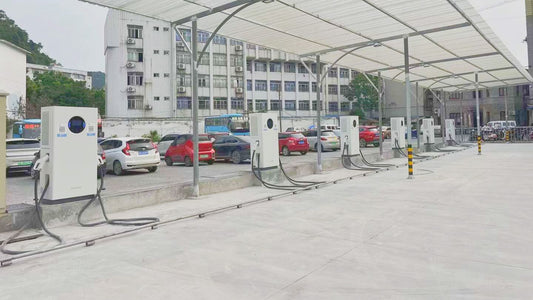Electric vehicles (EVs) are becoming increasingly popular as more people recognize the benefits of electric driving. One of the main concerns for EV owners is how to charge their vehicles.
There are two main options available for charging an EV: home EV chargers and public EV chargers. Both options have their pros and cons, and choosing the right one depends on your driving habits, lifestyle, and budget.
In this article, we'll compare home EV chargers and public EV chargers, and help you determine which option is best for you.
Home EV Chargers
Home EV chargers are EV charging stations that are installed at a residence, either in a garage or outside the house. They are designed for convenient charging and can be customized to fit the needs of the EV owner. Here are some of the benefits of home EV chargers:
Convenience: Home EV chargers provide the ultimate convenience of charging your EV at home. You can plug in your EV overnight or whenever it's convenient for you, without having to visit a public charging station. This is particularly beneficial for those who have a regular driving routine and can predict their charging needs.
Cost-effective: Home EV chargers can be cost-effective over time, as they eliminate the need to pay for public charging fees. They also allow you to take advantage of off-peak electricity rates, which can be significantly lower than peak rates.
Customizable: Home EV chargers can be customized to fit the needs of the EV owner. You can choose the charging speed, the charging cable length, and the location of the charging station. This means you can install the charger in a location that is most convenient for you, such as near the garage or driveway.
Reliability: Home EV chargers offer reliable charging, as they are under your control. You don't have to worry about waiting in line for a charging station, or the station being out of order. You can also monitor the charging process and ensure that your EV is charging properly.
Improved Battery Life: Home EV chargers can help improve the life of your EV battery. Charging at home regularly means that you are less likely to completely drain the battery, which can reduce its lifespan. Additionally, home chargers can be programmed to charge at a slower rate, which can reduce heat build-up and wear on the battery.
Despite the benefits, there are some drawbacks to home EV chargers, including:
High Upfront Cost: Home EV chargers can be expensive to purchase and install. Depending on the model and installation requirements, the cost can range from a few hundred to several thousand dollars.
Limited Charging Speed: Home EV chargers typically have a lower charging speed than public chargers. This means that it may take longer to fully charge your EV at home.
Limited Availability: Home EV chargers are only available to the EV owner and their guests. This means that if you need to charge your EV while away from home, you will need to rely on public charging stations.
Public Charging Stations
Public charging stations are available for public use. They are typically located in public places such as shopping centers, parking lots, and highways. Public charging stations are designed to provide charging options for EV owners who don't have access to home charging or who need to charge while away from home. Here are some of the benefits of public charging stations:
Accessibility: Public EV charging stations provide charging options for EV owners who don't have access to home charging. They also allow EV owners to charge while away from home, which can be convenient when traveling or running errands.
Faster Charging Speed: Public charging stations typically offer faster charging speeds than home chargers. Depending on the station, charging speeds can range from 50kw - 350kw.
Availability: Public EV charging stations are becoming more widely available, with many new stations being installed in public locations. This means that it's becoming easier to find a charging station when you need one.
Flexibility: Public EV charging stations offer more flexibility than home chargers, as they are available to anyone who needs to charge their EV. This means that you can use public chargers while traveling, running errands, or even on road trips.
Despite the benefits, there are also some drawbacks to public charging stations, including:
Cost: Public EV charging stations can be expensive to use, particularly if you need to charge frequently. While some public chargers are free to use, others may require payment through a subscription service or a per-use fee.
Inconvenience: Public EV charging stations can be inconvenient to use, particularly if they are located far from your home or destination. Additionally, some charging stations may be occupied, requiring you to wait in line to use them.
Reliability: Public EV charging stations can be less reliable than home chargers, as they are subject to use and wear from multiple users. Additionally, some charging stations may be out of order or not functioning properly, making it difficult to charge your EV when you need to.
Lack of Customization: Public EV charging stations do not offer the same level of customization as home chargers. You may not be able to choose the charging speed, cable length, or location of the charging station, which can make it less convenient to use.
Conclusion:
In summary, both home EV chargers and public charging stations have their pros and cons. Home EV chargers provide convenience, cost-effectiveness, and customization, while public EV charging stations offer accessibility, faster charging speeds, availability, and flexibility.
Ultimately, the choice between home and public charging depends on your individual needs and driving habits. If you have a regular driving routine and can predict your charging needs, a home charger may be the best option for you. If you frequently travel or need to charge away from home, a public charger may be a more practical choice.
Whichever option you choose, it's important to prioritize safety and follow proper charging protocols to ensure the longevity and performance of your EV's battery.




